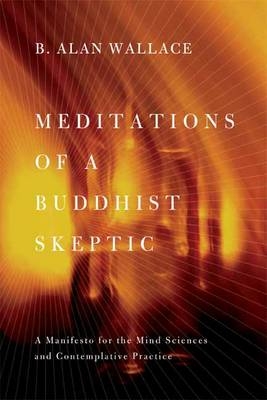
Meditations of a Buddhist Skeptic
Columbia University Press (Verlag)
978-0-231-15834-3 (ISBN)
Since Buddhism begins with the assertion that ignorance lies at the root of all suffering and that the path to freedom is reached through knowledge, Buddhist practice can be viewed as a progression from agnosticism (not knowing) to gnosticism (knowing), acquired through the maintenance of exceptional mental health, mindfulness, and introspection. Wallace discusses these topics in detail, identifying similarities and differences between scientific and Buddhist understanding, and he concludes with an explanation of shamatha and vipashyana and their potential for realizing the full nature, origins, and potential of consciousness.
B. Alan Wallace spent fourteen years as a Buddhist monk, ordained by H. H. the Dalai Lama. He then earned his undergraduate degree, summa cum laude, in physics and the philosophy of science at Amherst College, and his doctorate in religious studies from Stanford University. His Columbia University Press books are Mind in the Balance: Meditation in Science, Buddhism, and Christianity; Hidden Dimensions: The Unification of Physics and Consciousness; Contemplative Science: Where Buddhism and Neuroscience Converge; and Buddhism and Science: Breaking New Ground. A prolific writer and translator of numerous Tibetan Buddhist texts, he is the founder and president of the Santa Barbara Institute for Consciousness Studies (http://www.sbinstitute.com).
Prologue: Skepticism in Buddhism and Science Part I: Restoring Our Human Nature 1. Toward a Revolution in the Mind Sciences 2. Buddhism and Science: Confrontation and Collaboration 3. Buddhism and the Mind Sciences 4. A Three-Dimensional Science of Mind 5. Restoring Meaning to the Universe 6. What Makes Us Human? Scientific and Buddhist Views 7. Achieving Free Will Part II: Transcending Our Human Nature 8. Buddhist Radical Empiricism 9. From Agnosticism to Gnosticism 10. A Buddhist Model of Optimal Mental Health 11. Mindfulness in the Mind Sciences and in Buddhism 12. Shamatha and Vipashyana in the Indian Buddhist Tradition 13. Shamatha and Vipashyana in the Dzogchen Tradition Epilogue: The Many Worlds of Buddhism and Science Notes Selected Bibliography Index
| Erscheint lt. Verlag | 6.12.2011 |
|---|---|
| Verlagsort | New York |
| Sprache | englisch |
| Maße | 152 x 229 mm |
| Themenwelt | Geisteswissenschaften ► Philosophie |
| Geisteswissenschaften ► Religion / Theologie ► Buddhismus | |
| Naturwissenschaften ► Biologie ► Humanbiologie | |
| Naturwissenschaften ► Biologie ► Zoologie | |
| ISBN-10 | 0-231-15834-3 / 0231158343 |
| ISBN-13 | 978-0-231-15834-3 / 9780231158343 |
| Zustand | Neuware |
| Informationen gemäß Produktsicherheitsverordnung (GPSR) | |
| Haben Sie eine Frage zum Produkt? |
aus dem Bereich


